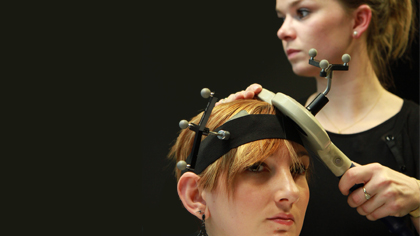Brain stimulation may reduce symptoms of anorexia
On BBC3 tonight, Jess McClelland from the Eating Disorders Section at the Institute of Psychiatry (IoP) at King’s explains how brain stimulation is being investigated as a potential new treatment for anorexia nervosa.
Following a successful pilot study published in 2011, the team, led by Professor Ulrike Schmidt at the IoP at King’s are now recruiting participants for a randomised controlled trial to assess the efficacy of repetitive transcranial stimulation (rTMS) in reducing the core symptoms of anorexia nervosa.

Image from: BBC3 'Inside my Mind'
rTMS is a non-invasive technique that enables stimulation of specific areas of the cerebral cortex. The procedure involves holding a coil that delivers the stimulation against the head adjacent to the brain regions of interest. rTMS is currently an accepted treatment for depression.
Jess McClelland says: “In our study, we are looking at the effects of the stimulation on some of the core symptoms of anorexia – things like urge to restrict food intake, urge to exercise and levels of feeling full, feeling fat and anxiety. With rTMS, we are targeting the dorsolateral prefrontal cortex, an area of the brain that is proposed to be involved in some of the self regulation and self control problems often associated with anorexia.”
The pilot study investigated whether one session of high frequency rTMS delivered to the left dorsolateral prefrontal cortex reduced eating disorder related symptoms following exposure to visual and real food stimuli. The study involved 10 people – their subjective experiences related to the eating disorder (e.g. urge to restrict, feeling full etc.) were assessed before and after rTMS. The study found that rTMS was safe and well-tolerated, and resulted in reduced levels of feeling full, feeling fat and feeling anxious.
The current study involves a randomised controlled trial of 64 individuals with anorexia to investigate whether one session of rTMS, compared to a placebo form of the stimulation is effective in reducing some of the negative emotions and preoccupation toward food and body weight/shape.
The second part of the study involves a feasibility case series study in which a small number of individuals with anorexia will be offered 20 sessions of rTMS over 4-6 weeks in order to establish whether a longer, therapeutic delivery of rTMS improves self-regulatory control over eating in anorexia.
Professor Ulrike Schmidt, Head of the Eating Disorders Section at the IoP at King’s says: “Anorexia affects approximately 1 in 150 teenage girls in the UK. Whilst there is a brief window for making a full recovery with early intervention, once anorexia nervosa is well-established the treatment response is usually much poorer and new treatments are desperately needed. Our research is at the very early stages but we have had some promising findings so far. Our current work is to assess whether rTMS is effective in a larger trial with the hope that rTMS may have the potential to be used in combination with current psychological treatments for anorexia.”
For further details about the study, or if you would like to participate, please contact Jessica McClelland in the Eating Disorders Section at King’s College London. Email: jessica.mcclelland@kcl.ac.uk
For media enquiries, please contact Seil Collins, Press Officer, Institute of Psychiatry, King’s College London. Email: seil.collins@kcl.ac.uk or tel: (+44) 207 848 5377